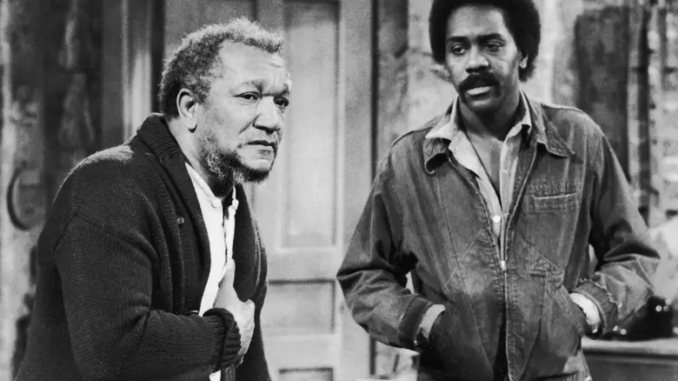
The world of comedy has always been a tight-knit brotherhood, a community where legends are forged and passed down from one generation to the next. For Redd Foxx, his legacy was cemented long before he became a household name as the lovable, crotchety junkman Fred G. Sanford on the iconic sitcom Sanford and Son. He was a trailblazing stand-up comedian, a master of the “Chitlin’ Circuit” who paved the way for countless Black comics. His influence was immeasurable, inspiring a new generation of comedic giants, most notably a young, impressionable Eddie Murphy.
But the final chapter of Redd Foxx’s life was a tragic one. Despite his fame and success, he died on October 11, 1991, at the age of 68, virtually penniless and deeply in debt. His death sent shockwaves through Hollywood, but it was his financial situation that truly stunned the industry. As the details of his funeral and burial arrangements became public, it was revealed that his family couldn’t afford a proper send-off. In a powerful, and largely unpublicized, act of kindness, it was his comedic son, Eddie Murphy, who stepped in to pay for his funeral and his headstone, a final tribute from a student to his master.
The Rise and Financial Fall of a Legend
Redd Foxx, whose real name was John Elroy Sanford, was a comedic force of nature. His stand-up routines were legendary—raunchy, unfiltered, and ahead of their time. He was a superstar in his own right, but it was his role in Sanford and Son that catapulted him to mainstream fame. For five seasons, the show was a ratings juggernaut, and Foxx became one of the highest-paid actors on television, earning a reported $25,000 per episode in the early days, a figure that would later climb to over $50,000.
But for all his comedic genius, Foxx was notoriously bad with money. He lived a lavish lifestyle, often spending as fast as he earned. He was also a generous soul, known for giving money to friends and family in need. This generosity, combined with poor business management and a devastating tax debt, led to his financial ruin. By the late 1980s, his financial situation was a complete mess. The IRS seized his assets, including his lavish Las Vegas home, and he declared bankruptcy, owing a staggering $3 million in back taxes.
By the time he died from a heart attack on the set of his show The Royal Family in 1991, he was not only broke but also deeply in debt. His death was a tragedy, but the discovery of his financial situation compounded the heartbreak for his family and his fans.
A Debt of Gratitude: Eddie Murphy Steps In
Eddie Murphy was a teenager in the 1970s when he first saw Redd Foxx perform stand-up. Murphy was immediately captivated by Foxx’s no-holds-barred delivery and his ability to command a stage. Foxx became one of his biggest influences, and as Murphy’s own career took off, he never forgot the man who paved the way.
As Murphy’s star rose to meteoric heights in the 1980s, he became a global sensation. He was one of the highest-paid actors in Hollywood, a comedic superstar who sold out arenas and had blockbuster movies. He used his platform to acknowledge his heroes, often giving shoutouts to Foxx.
When news of Foxx’s death broke, Murphy was deeply saddened. But when he learned that Foxx’s family was struggling to afford his burial, he knew he had to do something. Without a word to the media, Murphy quietly paid for the entire funeral service. He covered all the costs, from the funeral home expenses to the cemetery plot. His generosity didn’t stop there. He also paid for a beautiful headstone for Foxx’s grave, ensuring that the comedy icon would have a dignified final resting place.
This act was not done for public praise or recognition. It was a silent, private tribute from a man who owed a part of his career to the one who had just passed. Murphy’s act was a powerful symbol of the generational passing of the torch, a final sign of respect from the king of 80s comedy to the legend who had inspired him.
A Final, Heartbreaking Legacy
The story of Eddie Murphy paying for Redd Foxx’s funeral is more than just an act of charity; it is a profound lesson in the fleeting nature of fame and fortune. For a man who had made millions laugh, his final moments were a stark reminder of the financial struggles that often plague artists, even those who reach the highest levels of success. Foxx’s legacy, which was initially overshadowed by the details of his penniless death, was salvaged by an act of quiet, heartfelt generosity.
While Murphy never sought attention for his kindness, the story has become a cherished piece of Hollywood folklore. It stands as a testament to the bond between comedians and serves as a powerful reminder of the importance of honoring those who paved the way. Redd Foxx may have died without a fortune, but in his final moments, he was treated with the dignity and respect befitting a king, thanks to the student who had learned from the best.